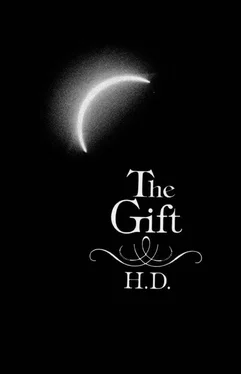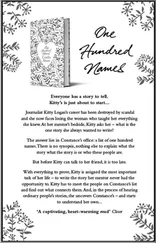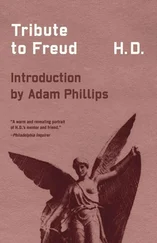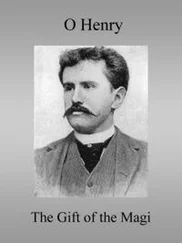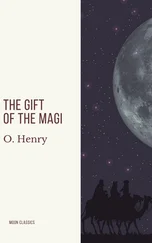Hilda Doolittle - The Gift
Здесь есть возможность читать онлайн «Hilda Doolittle - The Gift» весь текст электронной книги совершенно бесплатно (целиком полную версию без сокращений). В некоторых случаях можно слушать аудио, скачать через торрент в формате fb2 и присутствует краткое содержание. Год выпуска: 1982, Издательство: New Directions Publishing, Жанр: Современная проза, Биографии и Мемуары, на английском языке. Описание произведения, (предисловие) а так же отзывы посетителей доступны на портале библиотеки ЛибКат.
- Название:The Gift
- Автор:
- Издательство:New Directions Publishing
- Жанр:
- Год:1982
- ISBN:нет данных
- Рейтинг книги:3 / 5. Голосов: 1
-
Избранное:Добавить в избранное
- Отзывы:
-
Ваша оценка:
- 60
- 1
- 2
- 3
- 4
- 5
The Gift: краткое содержание, описание и аннотация
Предлагаем к чтению аннотацию, описание, краткое содержание или предисловие (зависит от того, что написал сам автор книги «The Gift»). Если вы не нашли необходимую информацию о книге — напишите в комментариях, мы постараемся отыскать её.
The Gift — читать онлайн бесплатно полную книгу (весь текст) целиком
Ниже представлен текст книги, разбитый по страницам. Система сохранения места последней прочитанной страницы, позволяет с удобством читать онлайн бесплатно книгу «The Gift», без необходимости каждый раз заново искать на чём Вы остановились. Поставьте закладку, и сможете в любой момент перейти на страницу, на которой закончили чтение.
Интервал:
Закладка:
But this was another sort of birthday; it was, of course, exactly, the birthday of the Child in the manger, in whose honor we had arranged the sheep on the moss, yet it was something else, indefinable yet deeply personal, something our perception recognized though our thought did not then relate our Child to the other Holy Children, His racial or spiritual or mythological predecessors. We arranged the sheep on the moss, but we did not think of Amen-Ra or the Golden Fleece, or even Abraham and Isaac. We gathered the moss ourselves, on trips to the mountains, or Uncle Hartley or Uncle Bob would make an excuse to get the moss for us. “Helen, all the thick moss has been pulled off the rocks for miles around, it’s too far for the children.” If it were a snowy December, the aunts and uncles might hire a sleigh and go off together and come back, screaming and laughing, with bunches of mountain laurel. Fir trees and pine and the laurel bough, We are twining in wreathes to greet thee now .
It was not only a small Child in a manger, in a stable, in a town that had the same name as our town. It was not only those wooden Wise Men that Aunt Millie had on their putz or the star that was clipped onto the highest single upstanding top-spray of the tree. It was not only the smell of the moss, it was not only the smell of the spiced ginger-dough that was waiting under a cloth in the biggest yellow bowl on the pantry shelf, and yet it was all these; it was all these and the forms of the Christmas cakes, the lion, the bear, the lady with no arms, like Mrs. Noah, the oak leaf, the round circle we called the moon, the actual star, the other animals.
The “thing” was that we were creating. We were “making” a field under the tree for the sheep. We were “making” a forest for the elk, out of small sprays of a broken pine-branch. We ourselves were “making” the Christmas cakes. As we pressed the tin mold of the lion or the lady into the soft dough, we were like God in the first picture in the Doré Bible who, out of chaos, created Leo or Virgo to shine forever in the heavens. “We” were like that, though we did not know it. Our perception recognized it, though our minds did not define it. God had made a Child, and we children in return now made God; we created Him as He had created us, we created Him as children will, out of odds and ends; like magpies, we built Him a nest of stray bits of silver thread, shredded blue or rose or yellow colored paper; we knew our power. We knew that God could not resist the fragrance of a burning beeswax candle!
There was the prickly sting of the pine needles under the rope that fastened the branches. The tree was standing on the back porch, looped round so that it stood up thin and stiff; at this moment, a child’s very ribs and diaphragm would be changed for a whole year with that deep intake of breath as Ida or Mama or even the new gardener cut the thick cord that bound the limbs; living limbs were bound and cramped in their rope cage.
There was that actual intake of breath (and the almost unbearable outbreathing of joy bordering on ecstasy) when the cord fell on the floor and nobody cared, nobody stopped to pick it up, though after Ida might call through the swing doors from the dining room, “Will one of you children undo these knots for me — this is good twine — and put it in the kitchen drawer.”
No; we will not undo her knots for her. We have other things to do, we are busy. Mama has bought a new pot of paste, “Unscrew the top, Gilbert, will you. There is a brush, too, where have I put it? Harold, run out to the kitchen and fill a glass with water. Where are my scissors? What a lot of old needles this year — take care — here, spill them out on this,” and she spreads out a piece of brown wrapping paper, “we’ll put all the scraps on this. That tinsel looks pretty dull, but perhaps we can use it once more at the back of the tree, for filling in. Maybe, you’ll find the top of this ball among the papers, Sister, if not, you can fasten a lump of wax to stick the hook in, you know how to do it. Here—” she finds the little candlestump.
There is still a frayed edge of the original red paper around the base, stuck to the wax. “I wonder whose candle this was, did you have a green or a red one last year?” Hilda cannot remember. Last year is a very, very long way off. Last year just after Christmas, they moved from the old town and the old house to this new big house that was built with the new transit house and the new observatory that wasn’t yet finished, for Papa, when they asked him to come to the university in Philadelphia. Philadelphia, even, is quite a long way off, Papa goes in to teach his students at the classes there. Papa is out now at his transit house; he may come in at any moment in his high boots and his fur cap, like a Russian in that picture they had at the Widows’ House that Mama said she and Aunt Laura made up stories about.
Zeisberger* preaching to the Indians is hanging in the sitting room, Washington at Mount Vernon is in the hall; the same clock is ticking in the hall that Mamalie’s papa himself made. It is a grandfather’s clock, it was made by Mama’s grandfather.
Everything is the same, yet in the great tide-wave of moving everything is different. What fun to move; “Papa is going to a bigger university, they are building him a transit house.” “What’s a transit house?” “I don’t know, it’s something important.” They felt alienated but important before they left, and the last Christmas tree was not quite like the others, but the reason for that — Papalie was dead, there was a new baby.
There was the painful wrench from the school but that pain too was mitigated; Miss Helen was leaving to get married, anyway. She gave each of her children a carte-de-visite photograph as Aunt Jennie called them; the reason, Aunt Jennie said, was that the photograph was not much larger than a visiting card. There were visiting cards from the Philadelphia ladies who came to call. There were many visiting cards on the Dresden platter on the table in the hall.
Rosa Bonheur’s Horse Fair was set on an easel in the front room. There were two rooms with big folding doors; there had been two rooms with folding doors in the old house. We folded the doors and pinned up a sheet for the magic lantern or for pinning on the donkey’s tail. There had been parties like that with the children up and down the street; now the children, the nearest, were two miles away. The school was a public school; “The children are too young,” Mama would explain to the university ladies, “to send in to town yet.” The new school was horrible.
There was something horrible about the school. We took lunch in a basket and did not get back until four. At the old school we went home at noon for lunch and did not go back to school until two, and then home at four. There were hours which were torture, it was too far to walk home in that noon hour and back. There was twelve to one for lunch. Now time included a new factor, a school clock in a public school ticked differently from the church clock in the old town. There was no doubt about it. There was nothing to do because Gilbert didn’t seem to mind and ran off and played baseball with the other older boys, but Harold was lonely with no child to play with.
Hilda felt Harold’s pain and loneliness but could not translate it into words. Later, she learned to get through the hour by skipping rope with the other girls, children from the near farms and from the small village. “It’s not that they’re common.” There were no words for it. They were different, they were younger in mind and reasoning; “Don’t think I will make any distinction with your children,” one of the teachers had said to Mama. It was a funny way for anyone to talk to Mama. We go to a public school; that is not what is wrong. It isn’t that the room smells differently, it’s the way the clock ticks on the wall.
Читать дальшеИнтервал:
Закладка:
Похожие книги на «The Gift»
Представляем Вашему вниманию похожие книги на «The Gift» списком для выбора. Мы отобрали схожую по названию и смыслу литературу в надежде предоставить читателям больше вариантов отыскать новые, интересные, ещё непрочитанные произведения.
Обсуждение, отзывы о книге «The Gift» и просто собственные мнения читателей. Оставьте ваши комментарии, напишите, что Вы думаете о произведении, его смысле или главных героях. Укажите что конкретно понравилось, а что нет, и почему Вы так считаете.
